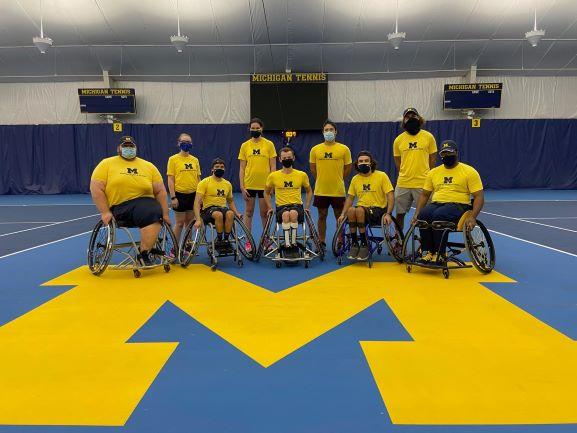Do you know about Adaptive Sports and Fitness? ‘Get out and get moving’ is not always as simple as it sounds. Physical fitness -- vital for your student’s health and wellness -- can be a challenge for individuals with mobility impairments. The Adaptive Sports and Fitness program at the University of Michigan is working to make sure all students have opportunities for participation -- whether the student is an advanced athlete or just wants to have fun.
Oluwaferanmi Okanlami, MD, MS is Director of Adaptive Sports and Fitness, a newly established unit within Student Life and Michigan Medicine. He is also Interim Director of Services for Students with Disabilities (SSD).
Dr. Okanlami explains that there are more than 60,000 children with disabilities in the United States who enjoy adaptive sports, “yet these opportunities drop drastically as teens enter college. Only a handful of adaptive sports programs exist in an intercollegiate environment. I am proud to say that U-M is addressing these needs and creating equal access to physical and emotional health and wellness for individuals with physical disabilities.”
Dr. Okanlami is uniquely positioned to take on this mission. In 2013, while in his third year of Orthopaedic Surgery residency at Yale New Haven Hospital in Connecticut, he sustained a spinal cord injury in a diving accident, leaving him paralyzed from the chest down with limited use of his upper extremities.
There are four core areas that the Adaptive Sports and Fitness program addresses to create holistic service areas that work towards the units’ mission and vision:
Student Group
The Adaptive Sports and Fitness Student Group has the objective of engaging undergraduate and graduate students to educate, spread awareness, and get people involved in adaptive sport. If your student is looking to get involved, volunteers are always welcome.
Adaptive Fitness
This core component gets more people aware of and engaged in physical and recreational activity that is adaptive and accessible for persons with disabilities. According to Dr. Okanlami, the program places great importance not just on supporting and developing athletes, but on supporting people in becoming the best version of themselves as an individual, student, professional, and athlete.
Adaptive Sports
The program currently offer opportunities for athletes to compete in four Paralympic sports:
• Wheelchair Tennis
• Track and Field
• Para-Equestrian
• Wheelchair Basketball (Recreational)
Adaptive Sports & Inclusive Recreation Initiative
The primary goals of the Inclusive Recreation Initiative (ASIRI) are to reduce the barriers and increase the access to physical fitness opportunities for children with and without physical disabilities by embedding adaptive sports and inclusive recreation programming into the physical education curriculum of Michigan public schools. By doing this, organizers decrease the disparity gap that exists between opportunities for children with disabilities compared to those of their peers without disabilities.
“As a program in the division of student life, directly reporting to the Associate Vice President for Health and Wellness, the purpose of adaptive recreation, fitness, and sport is to give people an equitable opportunity to develop their self-efficacy, learn life skills, lead an active and healthy lifestyle, create social relationships and have a sense of belonging, lose, win, and most importantly, have the agency to pursue life to the fullest,” Dr. Okanlami said.
Not everyone participating has a physical disability.
“We have a lot of students without disabilities participating. This is one way in which Michigan programming has a pioneering vision. We believe if we don’t limit it, we create an inclusive dynamic,” he said.
And the program is not just for expert athletes.
“We have wheelchair tennis player Chris Kelley, who is second in the nation in his sport, but we also have students who have never played tennis but want to get active. Another woman runs track because she wants access to fitness but also wants a community aspect,” he said “It’s about everybody having access. A lot of people have not been exposed to it -- they have heard of parasport, Paralympics -- but we want to provide that real life experience.”
The program also implemented Partners in Excellence (PIE) a program of ambassadors building community and leveraging the power of sports at U-M.
“We are truly trying to change the way your child with autism, depression, etc can experience fitness and sports. Your child can come here and play a sport, be on a team, Your child can come here in this atmosphere of inclusion,” he said.

